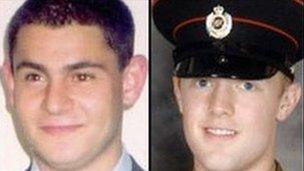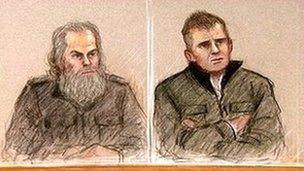Brian Shivers guilty of Massereene soldiers' killings
- Published

Patrick Azimkar and Mark Quinsey were murdered in March 2009
One of the men accused of murdering two soldiers at Massereene Barracks in Antrim has been found guilty on all charges and sentenced to life in prison.
Brian Shivers, 46, from Magherafelt was convicted of the murders of Mark Quinsey, 23, and Patrick Azimkar, 21.
They were shot dead by the Real IRA as they collected pizza in March 2009.
Shivers' co-accused, Colin Duffy, 44, from Lurgan was earlier acquitted of murdering the two soldiers.
Shivers was also found guilty of six counts of attempted murder and one of possession of two firearms and ammunition with intent to endanger life.
The soldiers were the first to be murdered in Northern Ireland since Lance Bombardier Stephen Restorick was killed by an IRA sniper in 1997.
Mr Duffy faced the same charges and was acquitted on all of them.
In his judgement on Brian Shivers, Judge Anthony Hart drew attention to Shivers' role in attempting to dispose of the getaway car used in the murders.
He said there could be no doubt that the person who set fire to the Cavalier played an essential part in the murderous attack because by setting fire to the car they were trying to destroy it, and so destroy any evidence that might lead to the arrest of those involved.
Geraldine Ferguson, the Mother of Patrick Azimkar: "This was a terrible crime"
He said that he was satisfied that Shivers' DNA was found on the two matches found on the back seat of the Cavalier, and that those matches were used to set fire to the car before all those present left the scene.
He also said that Shivers had lied about his whereabouts and actions on the night of the murders.
Judge Hart concluded: "I am satisfied that the prosecution has proved beyond reasonable doubt that Shivers set fire to the Cavalier at Ranaghan Road and I therefore find him guilty on each count on the indictment."
Insufficient
Acquitting Colin Duffy, Judge Hart told Antrim Crown Court that he was satisfied that Mr Duffy's DNA was found on a latex glove tip inside the car and on a seat buckle but he said the prosecution had failed to link the defendant to the murder plot.
He said: "There must be strong suspicion that Duffy did know what was going to happen and that that is why he has refused to give evidence.
"However, suspicion, no matter how strong, is not sufficient by itself to establish guilt beyond reasonable doubt, and is not an acceptable substitute for facts from which guilt can be properly proved.
"I consider that there is insufficient evidence to satisfy me beyond reasonable doubt that whatever Mr Duffy may have done when he wore the latex glove, or touched the seatbelt buckle, meant that he was preparing the car in some way for this murderous attack.
"And I therefore find him not guilty."

Colin Duffy (left), 43, from Lurgan, and Brian Shivers, 46, from Magherafelt, deny any role in the March 2009 murders
Reacting to the verdicts, Patrick Azimkar's mother Geraldine Ferguson said: "We are relieved that today one man has been convicted of the murders of our son Patrick and his friend Mark and the attempted murders of six other young men.
"We are of course disappointed that one of the defendants has been acquitted.
"This was a terrible crime that stole Patrick and Mark's lives."
Investigation continues
Chief Superintendent Peter Farrar who led the investigation said the case was not closed.
"We welcome the conviction today but we now want to take some time to study the judgement in full while at the same time continuing with the investigation," he said.
"I want to make it clear that police are determined to use every legitimate avenue to pursue terrorist criminals. This investigation is not over."
Sappers Mark Quinsey, from Birmingham, and Patrick Azimkar, from London, had been due to travel to Afghanistan hours after they were murdered.
Chief superintendent Peter Farrar: "Families and friends will live the rest of their lives dealing with consequences"
The dissident republican group, the Real IRA, claimed responsibility for the attack, which left several others injured.
The Real IRA was born out of a split in the mainstream Provisional IRA in October 1997, when the IRA's so-called quartermaster-general resigned over Sinn Fein's direction in the peace process.
It carried out the worst single atrocity of over 30 years of violence in Northern Ireland when it bombed the County Tyrone town of Omagh, killing 29 people, in August 1998.
- Published20 January 2012
- Published20 January 2012
- Published20 January 2012
- Published20 January 2012
- Published20 January 2012
- Published20 January 2012
- Published21 December 2011